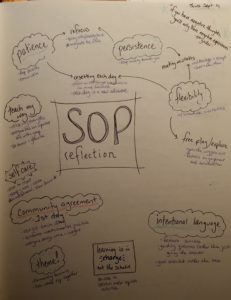Looking back at previous lesson observations can be enlightening, especially when from the very beginning of ones practice, in this case residential environmental education. Yet this is what I did, and happily enough what I saw was not overly embarrassing. Unsurprisingly, I spoke softly which is a trait of mine, yet despite my low volume the students remained engaged with the activity. As I was slowly conveying instructions, I was also passing out materials, meaning that some students were working while I was still explaining. I circulated amongst the students as they worked, checking for understanding and providing additional instructions as needed. Overall, my demeanor was calm and I appeared well-prepared for the lesson and how to individually redirect students finishing early or needing additional help.
The Path to Stewardship lesson is one of the key activities for our program, thus I put a lot of effort into preparing for it. My instructions were well-thought out and I had my notes in-hand as backup, I had purposefully selected the location (Pond Amphitheater) and the prior activity to get students in a thoughtful mindset (Solo Walk). Most elements seemed to click nicely into place for this activity and the immediate feedback I received was overwhelmingly positive. One key detail that stood out was the timing of instructions. After materials were passed out and students had begun working, I continued to add in additional instructions. While this did not seem to derail students, it is unclear if those words were heard.
From this strong starting point in my practice, I have continued to develop my skill-set, gaining confidence and experience as an environmental educator. While there will always be new skills to learn and integrate, I believe a focus of mine will be how to adapt my role as educator to mesh seamlessly with my introverted personality. This means fine-tuning my instructional roll-out to minimize my voice time and maximize student-centered time. This idea compliments my belief of educators as facilitators of experiences rather than as a sage on the stage. In making this transition, I hope to increase student engagement and push the limits of their curiosity about our natural world.

